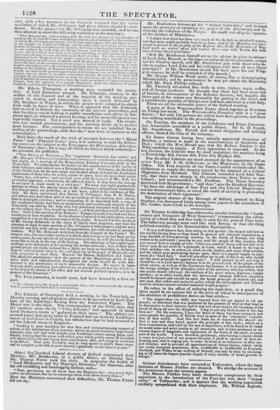Sir Thomas Lethbridge has addressed a sensible letter to the
"Land- owners and Occupiers of West Somerset," recommending the substi- tution of a fixed duty and free trade in corn for the present Corn-laws. The following passage must read like rank heresy, or that vile thing political economy, to the Somersetshire Squirearchy-
" It is a well-known fact, that owing to this masket (the largest and best in the world) having been so long closed to general and constant importation, a large breadth of wheat-growing country, in the North of Europe, has long ceased to be cultivated ; proving to you, and the people of this country, that you cannot have a supply of corn when you want it,' if you will not take it in when you do not want tt, a principle in trade, which is found to be true in other atticles—viz, in cotton, in wool, in silk, timber, and many other articles, and for which your ports being always open, there is a regular supply on pay- ment of a 'fixed duty.' And will you allow me to ask, if this is so, why should not the same principle be applied to corn ? I will venture to tell you why it should be—it is (not merely) because it is the general wish of the people of the whole nation, as wells. of the Continent, but because it is in consistence with the benign wisdom of' the Almighty ruler of the universe, who has willed, that one nation should (through the medium of his great watery highway) supply another ; or in other words, that the intercourse between different countries should be formed and carried on upon the broad principle of tnutual aid, and not upon that selfish and exclusive policy which the short-sighted and illiberal motives of some narrow-minded reasonera would propose."
He refers to the effect of reducing the wool-duty, as a proof that there would be no ruinous fall in the price of wheat in consequence of the abolition of prohibitory duties on that article- " The import-duty (in 1829) was lowered from 6d. per pound to Id. per pound ; an alteration that was predicted by the growers of wool at that time to be destructive to their interest, and it was said must tend to the lessening of the breed of sheep all over the kingdom. I beg to ask any flock-master if this has been so? On the contrary, I aver the breed of sheep has been increased, and consequently the quantity of British wool in spite of the 'enormous' imports. lion of that article. And this fact leads me to deprecate the absurd cry that is now and then heard against the principle of free trade ; which on a close examination, and tried by the test of experience, will be found to be based on sound sense and strict justice to all countries, and to have produced an in- creased degree of happiness and enjoyment of the fruits of the earth, in every part of the world. I trust, therefore, gentlemen, entertaining a sincere desire to come to a juat view of our present situation, I shall be excused in thus ad- dressing you, and in urging you to come forward in an endeavour to allay un- just clamour, and to prevent all apprehensions of future famine, which (with our vastly-increased population, from 14,000,000 to 18,000,000 in England, Scotland, and Wales, to say nothing of Ireland) can only be done by encourag- ing at all times the largest possible supply of toed, whether of home growth or foreign."


























 Previous page
Previous page